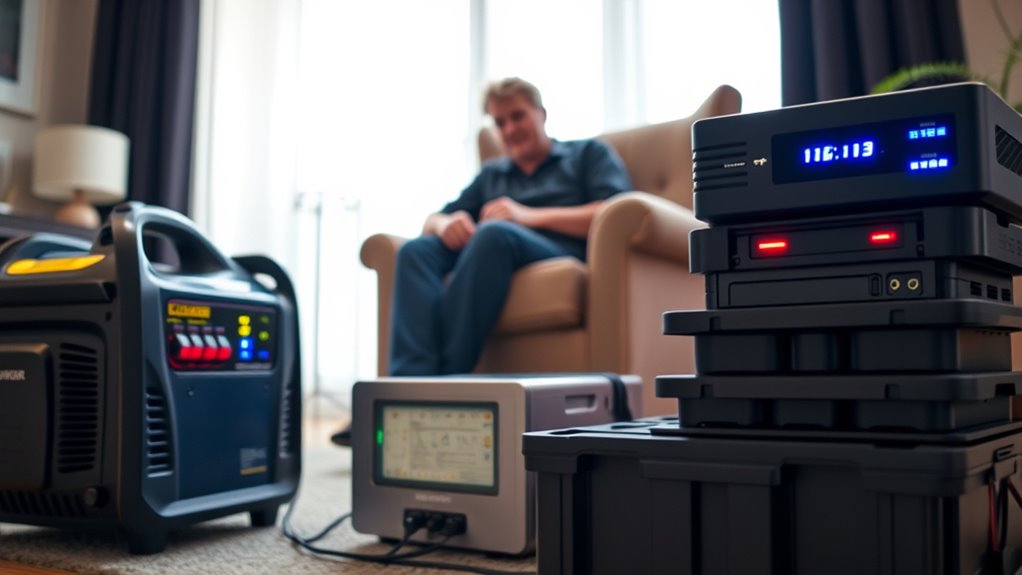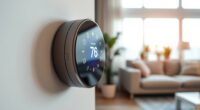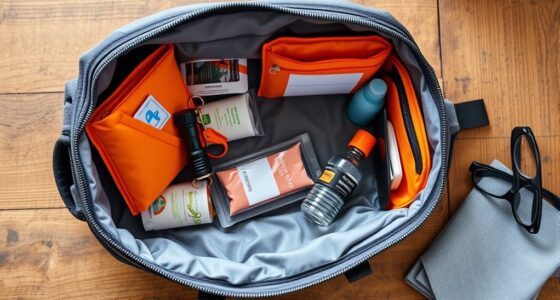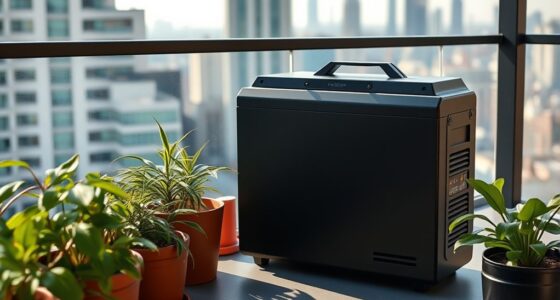To prepare for power outages and keep your medical devices running, consider using solar generators and battery backups. Solar generators harness sunlight to provide renewable power indoors, while battery backups offer immediate support during outages. Make certain these options meet your device’s power needs and are regularly maintained. Combining both can ensure continuous operation and peace of mind. If you want to learn more about setting up effective backup plans, keep exploring your options.
Key Takeaways
- Assess the power requirements of your medical devices to select appropriate backup solutions like solar generators or battery backups.
- Keep backup power units fully charged, tested regularly, and stored accessibly to ensure readiness during outages.
- Consider combining solar generators for eco-friendly energy with battery backups for immediate, stable power.
- Verify that backup devices provide clean, surge-free power suitable for sensitive medical equipment.
- Stay informed about local power outage risks and sunlight conditions to plan and maintain effective backup strategies.
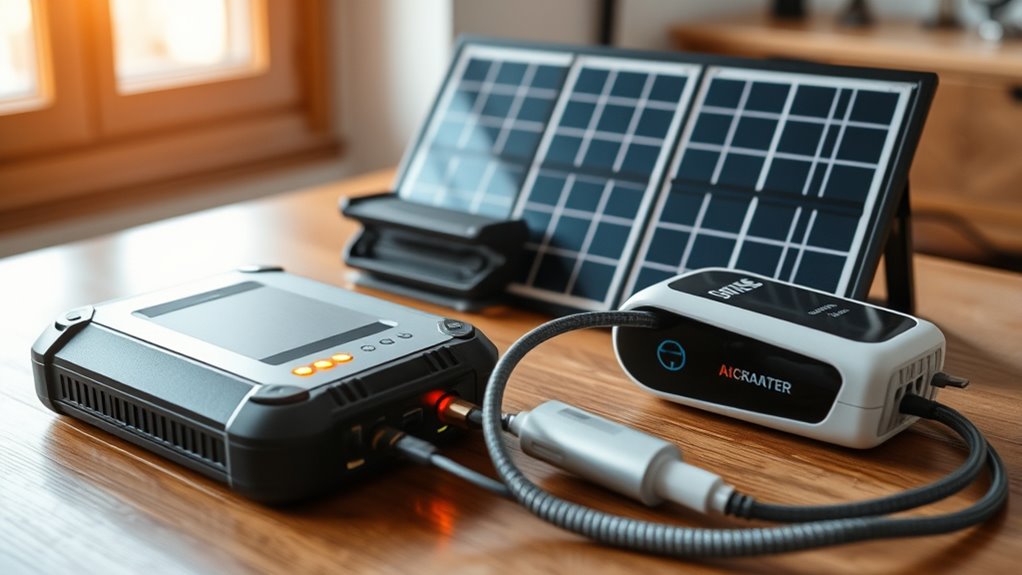
Have you ever considered what happens if your medical device loses power or malfunctions? Power outages can be more than just inconvenient—they can be life-threatening, especially if you’re relying on devices like ventilators, CPAP machines, or infusion pumps. To stay prepared, it’s crucial to explore backup options that guarantee your device remains operational during emergencies. Two effective solutions are solar generators and battery backups. These options can provide peace of mind, knowing that your critical devices won’t suddenly shut down when the power grid goes down.
Solar generators are a smart, eco-friendly choice. They harness sunlight to produce electricity, making them a reliable source of backup power in sunny conditions. Unlike traditional generators, solar units don’t emit fumes or require fuel, and they operate quietly, which is ideal for indoor use. When paired with your medical device, a solar generator can provide continuous power during extended outages. You simply need to verify the generator has enough capacity to meet your device’s power requirements. Additionally, many solar generators come with multiple outlets and USB ports, allowing you to connect your device directly or charge other essential gadgets like smartphones or medical accessories. To maximize their effectiveness, you should keep the solar generator charged and stored in a location accessible during emergencies. Remember, sunlight availability varies, so supplementing solar power with a battery backup is often a good idea.
Battery backups, also known as uninterruptible power supplies (UPS), are another crucial backup option. They work by providing immediate power when the main supply is interrupted, giving you enough time to switch to a more substantial power source or to shut down your device safely. Many battery backups are designed specifically for medical devices, offering clean, stable power that prevents surges or interruptions that could harm sensitive equipment. These units are compact, easy to set up, and often include indicator lights to show their charge status. For critical devices, it’s advisable to select a battery backup with sufficient capacity to run your device for several hours, especially if you anticipate longer outages. Some models also have automatic transfer switches, which detect power loss and switch seamlessly, so you don’t have to manually intervene during an emergency.
Frequently Asked Questions
How Long Can Backup Power Options Sustain Medical Devices?
You wonder how long backup power options can keep your medical devices running. It depends on the battery life and power capacity of your backup system. Smaller battery packs might last a few hours, while larger ones can sustain devices for several hours or even days. Always check the specifications of your backup power source to guarantee it meets your device’s energy needs during an outage.
Are Portable Generators Safe for Indoor Use During Outages?
Portable generators are not safe for indoor use during outages. For indoor safety, you must keep generators outside and away from windows and vents to prevent carbon monoxide poisoning. Proper generator placement is vital—set it on a dry, stable surface, and guarantee exhaust fumes don’t enter your home. Always follow manufacturer instructions and install carbon monoxide detectors nearby to protect yourself and your loved ones.
What Maintenance Is Required for Backup Power Systems?
To guarantee your backup power system stays reliable, you need to perform regular maintenance. You should routinely test the batteries to confirm they’re holding a charge and check for any signs of corrosion or damage. Additionally, schedule system inspections to verify all components, including connections and generators, are functioning properly. Regular maintenance keeps your backup system ready, so you can rely on it during an outage without worry.
How Do I Prioritize Devices During a Power Outage?
Think of your devices as a relay race team; some runners need to finish first. You prioritize by labeling your devices with clear, easy-to-understand tags, especially critical ones like ventilators or monitors. Keep an updated list of emergency contacts nearby. During a power outage, focus on devices essential for health and safety, ensuring they stay powered first. Always communicate your priorities to caregivers and emergency responders.
Can Backup Options Be Integrated With Smart Home Systems?
You can definitely integrate backup options with your smart home system. Many backup power solutions, like UPS devices or generators, offer automation compatibility, allowing you to automate switching during outages. Smart home integration enhances your setup by enabling remote control and real-time monitoring, ensuring your medical devices stay powered. Check your backup system’s compatibility with your smart home platform to create seamless automation, keeping your devices operational during emergencies.
Conclusion
Think of your medical devices as a trusty ship steering stormy seas. When power outages strike like sudden squalls, your backup options are the sturdy lifeboats that keep you afloat. By having a plan—whether batteries, generators, or portable power—you guarantee your health journey stays steady, no matter the weather. Prepare now, and turn potential chaos into calm waters, knowing you’ve got the right tools to weather any storm.
